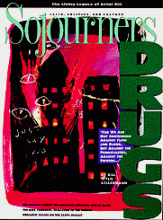On March 26, former heavyweight boxing champion Mike Tyson was sent to prison to serve a six-year sentence for raping a Miss Black America contestant. Before the verdict, the odds in Las Vegas (where you could place a bet on the trial) were running 5-to-1 in Tyson's favor.
After the judge's decision, people lined up to call Tyson the victim--of either a racist judicial system or a sporting establishment that encouraged his aggressive violence in the ring and looked the other way when it spilled over into streets, parking lots, and hotel rooms. His buddy Donald Trump suggested that if Tyson would just donate some of his millions to a rape crisis center all would be well.
But this time the perpetrator didn't get away with it. Desiree Washington, an 18-year-old college student, went up against Tyson's notoriety, wealth, and handlers--and won. This, despite the predictable efforts of the defense to blame her for her own suffering; despite Tyson's claim in his pleading before his sentencing that he was innocent because "there were no black eyes, no broken ribs." For rape survivors everywhere, Washington's courage brought new hope that justice is sometimes done.
The Tyson trial was only the most recent in a series of controversial skirmishes in the battle of the genders in late 1991 and early 1992. The one that first riveted the nation's attention, of course, was last October's confirmation hearings of Clarence Thomas. Although Anita Hill's charges against Thomas of sexual harassment were not enough to derail the Supreme Court nominee's confirmation, they served to bring the nation to a heightened sensitivity about the issue. According to The Washington Post, formal complaints of sexual harassment against corporate employers jumped substantially in the three months following the hearings, as did requests for sensitivity training and orders for a guidebook on combating sexual harassment in the workplace.
Read the Full Article
